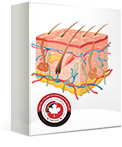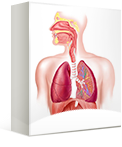To view/print documents on this website you will need Adobe Acrobat Reader™.
We offer a wide range of healthcare training options. If your organization would like to customize one of our programs for internal use, or work with us to develop a workplace-specific program, please contact us. We are here to help.

Medical Terminology
The Medical Terminology course provides an introduction to the professional language used by those who are directly and indirectly involved with the art of healing. The course will also introduce those not currently involved in the health care environment with an introduction to the language of medicine. In addition, the program will provide participants with the basics of human anatomy and physiology.

WHMIS 2022
WHMIS 2022 online course is based on the current legislation and meets the legislated requirement for general WHMIS training. Employers must also provide workplace-specific training and instruction for each of the hazardous products in the workplace.
WHMIS 2022 has come into effect with a transition period that lasts 3 years (full implementation by December 31, 2025).

Skin Care and Pressure Ulcer Prevention
Skin Care educates participants about common skin conditions, describes appropriate care of wounds and pressure sores, and provides general skin care guidelines.
This program was developed by Spinal Cord Injury Alberta and the Wound, Ostomy and Continence Institute
Basic Anatomy
Basic Anatomy describes the systems and vital organs that make up the human body, the components and functions of each, and how the parts of the body interact.
Upon completion of the course, students will be able to: Know the components of each body system Identify the functions performed by each system Recognize how each system interacts with the other body systems.

Intro to Cybersecurity in the Workplace
Intro to Cybersecurity in the Workplace is video based online training course taught by award-winning educators Will Durocher and Cameron Shaver. It should take about 1.5 hours to complete. After watching the engaging video content for each unit, you will complete a short quiz or activity which will assess your learning. A certificate of completion is awarded upon completion of the training.
Unit 1: Cybersecurity is everyone’s responsibility
Unit 2: Social Engineering Attacks and Defence
Unit 3: Protecting Against Scams and Fraud
Unit 4: High Tech Attacks and Defence
Unit 5: Securing Personal and Organizational Cybersecurity

COVID-19: General Canadian Workplace Safety
COVID-19: General Canadian Workplace Safety helps participants understand COVID-19, how it spreads, and general safe work practices to protect their health and the health of others.
Participants will learn about safe practices, including:
- Proper Handwashing
- Respiratory Hygiene
- Social Distancing
- Cleaning and Disinfection
- The use of non-medical face masks and gloves
- What to do if you become ill or are exposed to illness
*Note: This course is not appropriate for health care workers, or others who may work with, or in proximity to, patients diagnosed with COVID-19.

Personal Care
Personal Care educates participants about personal care activities, with a focus on helping individuals maintain personal hygiene and grooming routines.

Respiratory Care
Respiratory Care educates participants about illnesses and conditions that can affect breathing, and describes practical ways to assist someone who is experiencing breathing diffic

Feeding Eating Swallowing

Bloodborne Pathogens
This program is designed for individuals who may be exposed to blood and body fluids or items contaminated with blood during the performance of their work and who wish to gain a basic understanding of bloodborne pathogens.

Unconscious Bias In The Workplace

Respect and Inclusion in the Workplace
Diversity encompasses all of the ways that we are different from each other, including factors like ethnicity, culture, religion, age, gender, sexual orientation, and sexual identity. This course educates participants about acceptable and unacceptable workplace attitudes and behaviours, including discrimination, harassment, and bullying, identifies appropriate ways to respond, and provides practical strategies to support an inclusive workplace environment where everyone feels safe and respected. This course is endorsed by Safety Services Canada.

Diversity and Inclusion Training for Volunteers
Volunteers are the public face of community events, non-profit organizations, and the corporate sponsors that support those events and organizations. Volunteer workforces should be diverse and inclusive, and every volunteer should feel safe, respected, and appreciated at all times. This course educates volunteer workers about acceptable and unacceptable attitudes and behaviours, how to respond appropriately, and their role in supporting a respectful, productive volunteer environment.




